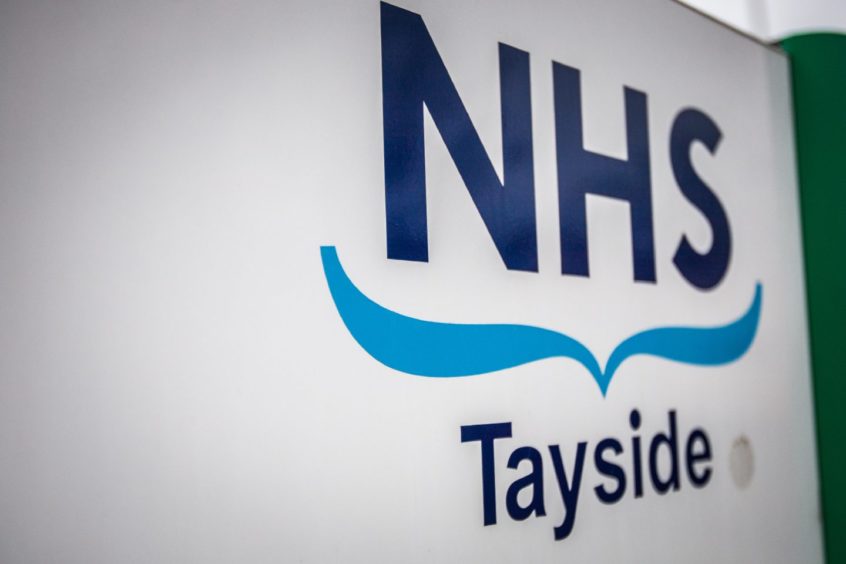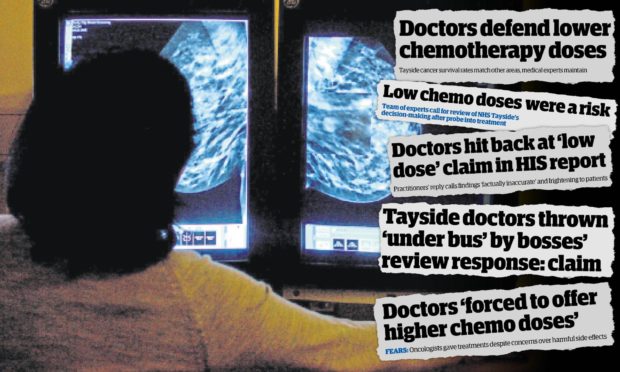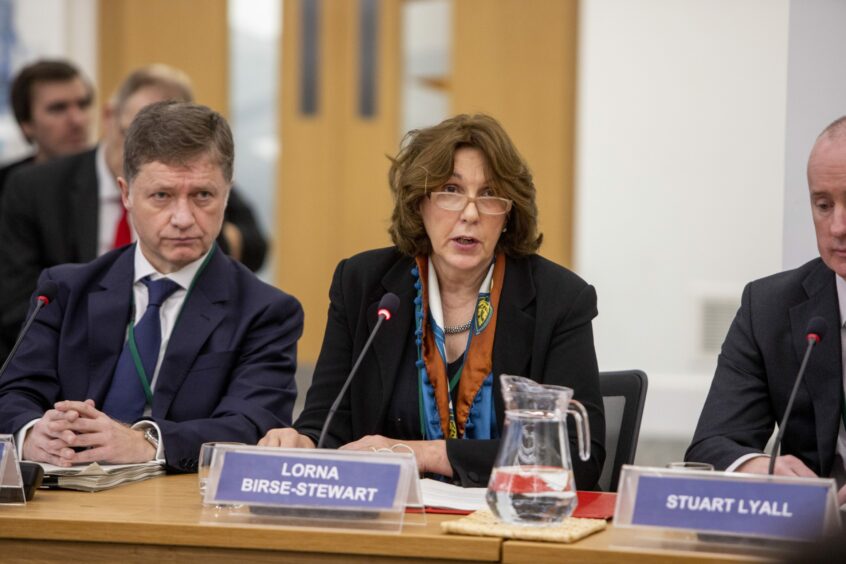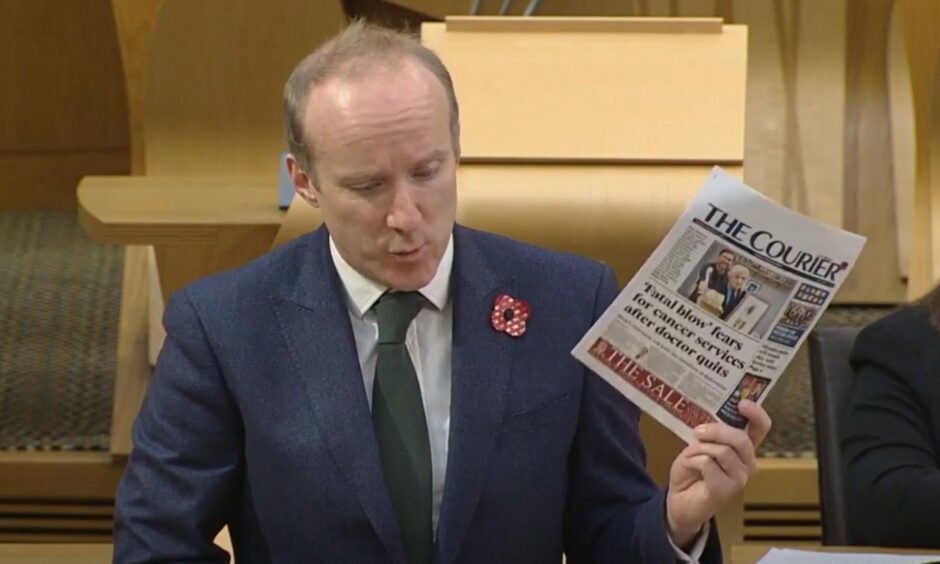NHS Tayside is at the centre of bombshell cover-up claims over its handling of a breast cancer treatment scandal.
Letters obtained by us reveal Dr Norman Pratt, a non-executive member of the health board, accused senior management last year of being “complicit in the cover-up of a major clinical service scandal”.
He is said to have described their behaviour as “on a par with those actions reported in respect of the most major public life scandals of the last 20 years”.
Around 200 patients were given lower-than-standard doses of chemotherapy drugs by doctors in Tayside between December 2016 and March 2019 in a bid to reduce harmful side effects.
Dr Pratt alleges the health board’s “own medical management” privately accepts there is no clinical evidence patients were put at any increased risk – but have allowed doctors to remain in the firing line over a series of botched and disputed government reviews.
He was a member of the board when it signed off on those government reviews in 2019 but has since come to the view that they did not fully investigate the available evidence.
After raising concerns at the end of 2020, the clinician was issued with a copy of the board’s code of conduct and asked to reflect on his own behaviour.
That response has been described by an MSP as “entirely insufficient” and having the appearance of trying to silence a complainant.
More than a year later, Dr Pratt has written to members of the Scottish Parliament’s cross-party cancer group still seeking answers for doctors and patients.
‘Overwhelming’ need for action
Dr Pratt, who has more than 40 years experience in the NHS, is chair of the area clinical forum and healthcare science forum, sits on the audit and risk committee, and is highly respected as head of genetics at the health board.
He believes he is “mandated to follow up on key clinical issues where there is a clear professional consensus that some definitive action is required”.
Dr Pratt says that consensus is “overwhelming” in the case of breast cancer care in Tayside.
I have never read anything like it. The concerns Dr Pratt has raised merit immediate independent investigation.
North East MSP Michael Marra
In a letter on November 10 2020, chairwoman Lorna Birse-Stewart told him: “In effect you have accused me, the chief executive, the executive management team and the board of being complicit in the cover-up of a major clinical service scandal.”
She quotes Dr Pratt as stating the actions of the senior management team “are characterised by cover-up, damage limitation and lack of transparency”.
He is also quoted as saying: “I believe that the final bitter harvest of the breast cancer crisis will be bigger and more profound than our endowment fund scandal, where executive and non-executive colleagues were roundly criticised for an abdication of duty.”
Deep concerns
In the letter, Mrs Birse-Stewart outlines “the detail of my deep concerns” over Dr Pratt’s statements, saying it is “impossible to overstate the seriousness of the allegations that you have made”.
He was also told not to contact Mrs Birse-Stewart or any other board members until further inquiries were carried out.
It is not clear what further action, if any, NHS Tayside took in relation to the concerns, and the health board would not comment on the substance of the letter.
Scottish Government-commissioned reviews said the lower doses of chemotherapy offered to patients resulted in a 1-2% increased risk of their cancer recurring.
The findings were accepted in full by bosses at NHS Tayside but the doctors claim they were “deeply flawed” and did not properly consider practice in other hospitals or the available clinical evidence around lower doses.
They claim the handling of the revelations – described by one physician as a fiasco – was in part down to a drive to stamp out variation in cancer treatment across Scotland.
A series of investigations by us revealed one of the experts behind the increased risk claim later privately admitted it was “flawed, probably, but the best that could be done, really”.
The doctors were subsequently cleared of any wrongdoing by the General Medical Council in a ruling that appears to conflict with the government-ordered reviews.
‘No clinical evidence’ for risk claim
In an email to Dr Gregor McNie, the Scottish Government’s lead on cancer strategy, on February 19 this year, Dr Pratt warned patients could incorrectly be led to believe that any recurrence of their cancer is because of the treatment they received.
He stressed there is “no clinical evidence that is the case” and that this is “the same private conclusion of every colleague whose opinion I know and respect – including our own medical management.”
The revelation has sparked fresh calls for an independent investigation, with North East MSP Michael Marra saying the issues at stake “could scarcely be more serious”.
“The concerns raised by this very senior member of NHS Tayside staff, as acknowledged by the chair of the board, are extraordinary and explosive,” Mr Marra said.
“I have never read anything like it. The concerns Dr Pratt has raised merit immediate independent investigation.
“The response here is entirely insufficient and could easily be read as an attempt to silence the complainant.”
NHS Tayside’s statement in full
“The level of the dose of chemotherapy treatment offered to some breast cancer patients in Tayside between December 2016 and April 2019 is a matter which has been the subject of intense public scrutiny.
“It has been comprehensively examined by independent panels of experts who have issued recommendations for action to NHS Tayside and it has been reviewed and monitored continuously by Scottish Government. It is also the subject of regular, ongoing examination in the public domain and analysis in the media.
“The matter has been managed with full openness and transparency by NHS Tayside and in line with the duty of candour to those patients affected.
“The concerns about chemotherapy prescribing and the subsequent reviews – and criticism that was levelled at the service – have been difficult for all those involved. However, the matter has been, without doubt, the most difficult of all for the 304 patients and their families who were directly affected.
“The primary outcome of all of the external reviews is that Tayside breast oncology patients are offered a chemotherapy dose regime which is the same as would be offered in other areas in Scotland – and this has been the case since April 1, 2019.
“NHS Tayside remains absolutely committed to providing high-quality, local services for breast cancer which are safe for patients, safe for staff and sustainable for the people of Tayside.
Key areas of concern and action
“Concerns were first raised by a whistleblower who said there were variations in chemotherapy treatment for breast cancer patients in Tayside compared with other health boards in Scotland. This followed an internal review of patients by Tayside’s oncologists in December 2016, following which there were changes applied to the chemotherapy dose given to some breast cancer patients locally.
“This change meant that the dose some patients received was different to that which might have been prescribed in other hospitals in the rest of Scotland. The oncologists made a decision for Tayside patients based on this review to reduce the dose of chemotherapy with the sole aim of reducing some of the worst side effects.
“Following the whistleblower’s concerns, Scotland’s Chief Medical Officer (CMO) and Chief Pharmaceutical Officer (CPO) commissioned Healthcare Improvement Scotland (HIS) to review breast cancer treatment in Tayside and a report was published on April 1 2019.

“This independent HIS report stated that NHS Tayside prescribing relating to chemotherapy in breast cancer was different to the rest of Scotland and it made recommendations which all members of the Board of NHS Tayside accepted in full.
“At the time of the publication of the HIS report, NHS Tayside contacted all patients affected directly to advise them of the HIS report and its findings and offered them a review consultation with an oncologist to discuss their chemotherapy dose and any other concerns they may have.
“An expert independent panel (Immediate Review Group) also reviewed the HIS report to understand any potential impact on Tayside patients arising from the different approach to chemotherapy treatment. The panel reported that the risk of any negative impact on the probability of breast cancer recurrence of anyone treated from December 1, 2016 was very small. The expert panel also stated that the oncologists took the decision in the best interests of patients.
“Since the publication of these independent, external reviews in April 2019 Tayside breast oncology patients have been offered the same chemotherapy treatment as they would be offered in other areas in Scotland.
Therefore, to conclude:
- Independent reviews concluded that there was variation in the prescribing practice relating to chemotherapy for breast cancer patients between December 2016 and April 2019 compared to the rest of Scotland.
- NHS Tayside Board accepted – and acted immediately – on the findings and recommendations of these reviews.
- Since April 1 2019, all breast cancer patients in Tayside have been offered the same chemotherapy treatment as they would receive in other hospitals in Scotland.
- There is absolutely no lack of transparency or openness in these matters. Indeed, all independent and external reviews have been published, recommendations acted upon and the matter has been discussed and scrutinised in great detail with both clinical teams and Board members at NHS Tayside.
- Throughout this issue, we have always taken matters raised with NHS Tayside extremely seriously and progressed actions swiftly when external bodies and independent panels have recommended that we make changes to practice and governance processes.
- This is demonstrated very clearly by the fact that we have acted on all concerns, from the time of the original whistleblower’s claims through the issues raised in all external reports and reviews. We also continue to respond to patients’ concerns, many of whom remain, understandably, distressed.
- Our priority, and that of our clinical teams, remains that we will strive to continue to provide a local breast oncology service to the people of Tayside which is high-quality, safe for patients, safe for staff and sustainable for the future.


